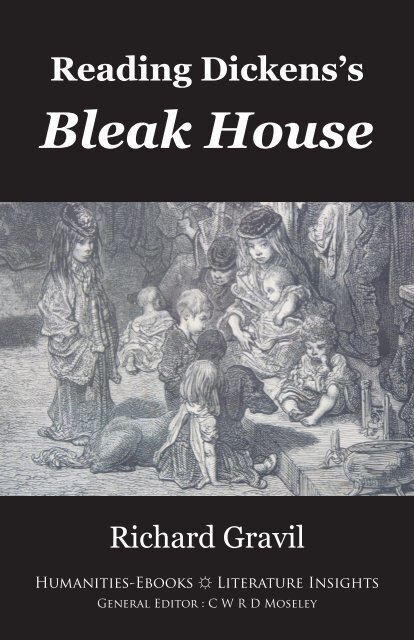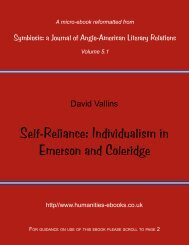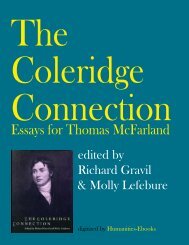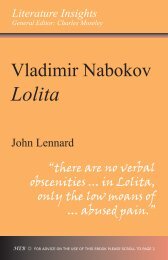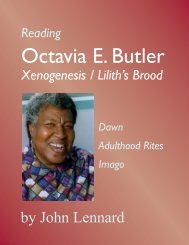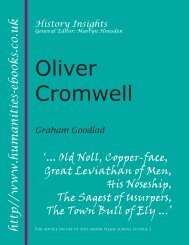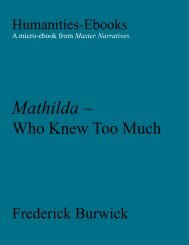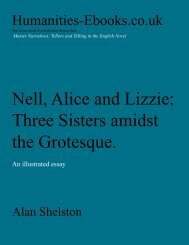Chapter 1. Why read Bleak House? - Humanities-Ebooks
Chapter 1. Why read Bleak House? - Humanities-Ebooks
Chapter 1. Why read Bleak House? - Humanities-Ebooks
Create successful ePaper yourself
Turn your PDF publications into a flip-book with our unique Google optimized e-Paper software.
Reading Dickens’s<br />
<strong>Bleak</strong> <strong>House</strong><br />
Richard Gravil<br />
<strong>Humanities</strong>-<strong>Ebooks</strong> ☼ Literature Insights<br />
General Editor : C W R D Moseley
to buy this book<br />
If your search engine has brought you straight to<br />
these sample pages please follow this link to the<br />
<strong>Humanities</strong>-<strong>Ebooks</strong> web page for this item.<br />
PLEASE VISIT<br />
HUMANITIES-EBOOKS.CO.UK
Reading ‘<strong>Bleak</strong> <strong>House</strong>’<br />
by Richard Gravil<br />
A Literature Insight from<br />
HEB ☼ <strong>Humanities</strong>-<strong>Ebooks</strong>
Contents<br />
A Note on the Author 7<br />
A Note on the Text 8<br />
<strong>Chapter</strong> <strong>1.</strong> <strong>Why</strong> <strong>read</strong> <strong>Bleak</strong> <strong>House</strong>? 9<br />
<strong>1.</strong>1 Apocalypse Now? 9<br />
<strong>1.</strong>2 Experimental Fiction 10<br />
<strong>1.</strong>3 Reading for the plot 11<br />
<strong>1.</strong>4 You, the Detective 14<br />
<strong>1.</strong>5 Rewards 15<br />
<strong>Chapter</strong> 2: Dickens and his Times 17<br />
2.1 Charles Dickens 17<br />
2.2 Intellectual Context 20<br />
2.3 Fictional Contemporaries 23<br />
2.4 Topicality in <strong>Bleak</strong> <strong>House</strong> 24<br />
2.5 The Law 25<br />
2.6 Public Health 28<br />
2.7 Constitutional Deadlock 29<br />
2.8 Exploitation, appropriation, and philanthropy 32<br />
2.9 Dandyism, Puseyism, Aestheticism, Aristocracy 34<br />
<strong>Chapter</strong> 3: Dramatis Personae 35<br />
3.1 Caricature and Characterisation 35<br />
3.2 Major Characters 35<br />
3.3 Doubles—analogous and antithetical 46<br />
<strong>Chapter</strong> 4: Reading Serially 48<br />
First Instalment 48<br />
Second Instalment 54
6 Richard Gravil<br />
Third Instalment 57<br />
Fourth Instalment 61<br />
<strong>Chapter</strong> 5: Reading Analytically 66<br />
From <strong>Chapter</strong> 2, ‘In Fashion’ 66<br />
From <strong>Chapter</strong> 32, ‘The Appointed Time’ 70<br />
From <strong>Chapter</strong> 38, ‘A Struggle’ 75<br />
<strong>Chapter</strong> 6: Dickens’s Craft 80<br />
6.1 Narrative Technique 80<br />
6.2 Serialisation: Pluses and Minuses 82<br />
6.3 Satire, Irony, Humour, Comedy 83<br />
6.4 Imagery and Symbolism 86<br />
6.5 Language 88<br />
<strong>Chapter</strong> 7: Dickens and ‘the Woman Question’ 96<br />
7.1 Nineteenth-Century Feminism 96<br />
7.2 Is Esther ‘a new woman’? 104<br />
7.3 Esther’s Engagement, Marriage and Bereavement 107<br />
<strong>Chapter</strong> 8: Reception and Bibliographies 111<br />
8.1 Early Reception and Studies of Topicality 111<br />
8.2 The Problem of Esther 113<br />
8.3 Feminist approaches 114<br />
8.4 Psychological Approaches 117<br />
8.5 Deconstruction 118<br />
8.6 Adaptations 120<br />
8.7 Select Further Reading 121<br />
Literary Terms 123
<strong>Chapter</strong> <strong>1.</strong> <strong>Why</strong> <strong>read</strong> <strong>Bleak</strong> <strong>House</strong>?<br />
<strong>1.</strong>1 Apocalypse Now?<br />
George Bernard Shaw said of Dickens’s Hard Times, ‘This is Karl<br />
Marx, Carlyle, Ruskin, Morris, Carpenter, rising up against civilization<br />
itself as a disease’. Its message, Shaw said, was that ‘it is not our<br />
disorder, but our order that is horrible’. That judgement applies just<br />
as well to <strong>Bleak</strong> <strong>House</strong>, a novel in which Dickens develops a range<br />
of characters whose manner and behaviour is close to cannibalism or<br />
vampirism, to exhibit his views of capitalism. The figures mentioned<br />
by Shaw are all varieties of socialist: in fact, Dickens is less obviously<br />
socialist than some other novelists of the day, but at the time<br />
he was serialising <strong>Bleak</strong> <strong>House</strong> he was also serialising in <strong>House</strong>hold<br />
Words his immensely <strong>read</strong>able A Child’s History of England which<br />
shows him to be very partisan toward Oliver Cromwell and quite<br />
overtly republican.<br />
<strong>Bleak</strong> <strong>House</strong> is one of Dickens’s greatest achievements. It is<br />
rivalled only by Great Expectations as an experimental narrative,<br />
and by Our Mutual Friend for its combination of exuberant style and<br />
characterisation with powerful symbolic statements diagnostic of the<br />
condition of England. Written on a larger scale than any other ‘condition<br />
of England’ novel, <strong>Bleak</strong> <strong>House</strong> can also seem more radical. This<br />
is not because Dickens sets out any practical schemes of reform, but<br />
because he describes a social order which is clearly in terminal decay<br />
and beyond reform. England, in <strong>Bleak</strong> <strong>House</strong>, is suffering from some<br />
deep systemic disorder, for which the only cure, the imagery sometimes<br />
suggests, might be purgation by fire.<br />
You may not notice this on a first <strong>read</strong>ing (you will be too busy<br />
trying to follow the plot and remember who is who) but one of the<br />
recurring motifs of the novel is a tendency for things to collapse or<br />
combust. Symbolic fires, suggesting apocalyptic cleansing or the<br />
torments of hell, or both, break out from time to time; lameness is<br />
endemic, and London is reverting to mud. In one nightmarish scene,<br />
while wandering through the streets of London in search of one of its
10 Richard Gravil<br />
innumerable destitute persons, the mild Mr Snagsby and the mysterious<br />
Mr Bucket find themselves surrounded by shadowy figures of<br />
despair, reaching out from the abyss.<br />
<strong>1.</strong>2 Experimental Fiction<br />
<strong>Bleak</strong> <strong>House</strong> is surely one of the most experimental of nineteenthcentury<br />
classics. Like other famous multiple narratives, Emily Bronte’s<br />
Wuthering Heights, and Wilkie Collins’s The Moonstone, this<br />
novel invites the <strong>read</strong>er to become engaged in a process of judgment,<br />
while rendering that process more difficult by the very manner in<br />
which it is told. It interleaves two deeply contrasting narratives, of<br />
similar length, each with its own style, its own experience, and (arguably)<br />
its own values. Charles Dickens, internationally famous writer,<br />
campaigner for all kinds of reform, raconteur, wit, and man of the<br />
world, tells one half of the novel in heightened but unmistakably<br />
‘Dickensian’ style. But he elects to have the other half narrated by<br />
a diffident, illegitimate young woman—a decision critics have been<br />
trying to come to terms with ever since.<br />
At times the two narrators seem to be telling quite different stories,<br />
though in fact numerous characters appear in both narratives.<br />
Our ability to follow Esther Summerson’s story of what is termed<br />
her ‘progress’—from illegitimate childhood to happy and respectable<br />
marriage—depends crucially upon the impersonal narrator’s story,<br />
which concerns the downfall of the haughty Lady Dedlock, and the<br />
disgrace she brings upon an ancient house. When you re-<strong>read</strong> this<br />
novel—and a surprising amount of this huge book is designed to be<br />
relished on a second or third <strong>read</strong>ing—you will find that its structure<br />
enables you to concentrate on one narrative and skip much of the<br />
other. Many people choose the impersonal narrative for their second<br />
<strong>read</strong>ing, because it is remembered as funnier; and the personal narrative<br />
for their third <strong>read</strong>ing, because (on reflection) it is just as funny,<br />
but in a warmer tone.<br />
But there is more to this ‘split narrative’ than technique. <strong>Bleak</strong><br />
<strong>House</strong> was published at a time of unprecedented agitation on ‘the<br />
woman question’ and Dickens’s dual narrative, shared with an ille-
Reading <strong>Bleak</strong> <strong>House</strong> 11<br />
gitimate young woman who symbolises woman’s exclusion from<br />
legal existence, must be counted a major imaginative response to that<br />
major nineteenth-century issue. Although this facet of the novel has<br />
been ignored until very recently, thanks to Dickens’s generally wellserved<br />
reputation for not understanding women, Esther’s half of the<br />
book may deserve to be recognised as a minor classic of liberal feminism.<br />
Later in this Insight I will try to substantiate that claim.<br />
Dickens was both a novelist and a journalist. He started out as a<br />
parliamentary reporter, and later in his career published two popular<br />
weeklies, <strong>House</strong>hold Words and All the Year Round. Consequently,<br />
of all the great novelists of world literature, he is the one whose work<br />
has the sharpest flavour of topicality. Three of the novel’s major<br />
themes, the inefficiency of the Court of Chancery, the state of sanitation<br />
in the city (and the consequent prevalence of killer diseases, such<br />
as cholera, typhus, smallpox), and the paralysis of government, were<br />
topics of the day. A fourth theme is the muddleheadedness of organised<br />
charity. Through one of his most memorable characters, Mrs<br />
Pardiggle, Dickens shows the middle class to be incapable of communicating<br />
with the working poor. In another, Mrs Jellyby, he satirises<br />
the folly and hypocrisy of engaging in remote and impracticable<br />
charitable activities—seeking to export civilisation from a benighted<br />
and ‘boastful island’. At moments Dickens uses his immense authority<br />
as (probably) the most popular novelist of all time to appeal<br />
directly to the nation’s rulers, including at one point Queen Victoria<br />
herself. And he does so, most dramatically, when dealing with the<br />
obscure death of the most insignificant of her subjects, Jo, an illiterate<br />
crossing-sweeper, dying of cholera contracted in the squalid heart<br />
of London.<br />
<strong>1.</strong>3 Reading for the plot<br />
According to the reviewer in the Illustrated London News (24 September<br />
1853) ‘no man … could tell a story better, if he had but a story<br />
to tell’: and it is true that anyone <strong>read</strong>ing <strong>Bleak</strong> <strong>House</strong> for the plot<br />
will find it both bewildering and disappointing. Whether it really has<br />
a plot, or whether it matters, is very debatable. But it does tell three
12 Richard Gravil<br />
simultaneous major stories, interspersed with several minor ones.<br />
The first story is that of the resolution of a long-standing case in<br />
the Court of Chancery, known as ‘Jarndyce and Jarndyce’, into which<br />
several generations have been born, and on which several generations<br />
of lawyers have ‘fleshed’ their legal wit. The living suitors in<br />
the case, which has to do with a disputed will, include John Jarndyce,<br />
a man of infinite benevolence and infinite contempt for the law and all<br />
of its doings, and Richard Carstone, his ward. Richard is obsessed by<br />
the vain expectation that the case will make him rich, and he allows<br />
this expectation to divide him from John Jarndyce, who warns him<br />
repeatedly that no good ever came from a Chancery suit, except for<br />
the lawyers. (As the narrator explains in <strong>Chapter</strong> 39, ‘Attorney and<br />
Client’, ‘the one great principle of the English law is, to make business<br />
for itself.’). Richard’s gullibility leads to his exploitation by the<br />
parasitical Harold Skimpole and a predatory lawyer, Vholes. The lure<br />
of chancery, its spell, makes it impossible for him to settle to a sensible<br />
career. He is ruined, in health as well as financially. Secretly, he<br />
marries his fellow ward, Ada Clare, against the advice of their guardian,<br />
John Jarndyce. On his death he leaves his young wife pregnant<br />
and destitute.<br />
The second story (connected very loosely to the first by the fact<br />
that papers relating to the two stories are eventually found in the same<br />
place: Krook’s Rag and Bottle Shop) concerns the downfall of Lady<br />
Dedlock, who long before her marriage to the baronet Sir Leicester<br />
Dedlock, had a romance with Captain Hawdon. The romance produced<br />
an illegitimate child, who she supposed to be stillborn, but<br />
who was in fact spirited away to be brought up in secret by Lady<br />
Dedlock’s sister, Miss Barbary (formerly a friend of John Jarndyce<br />
and fiancee of his friend Lawrence Boythorn). In consultation with<br />
her lawyer, Mr Tulkinghorn, at the start of the novel, Lady Dedlock<br />
recognises the handwriting of her former lover. Mr Tulkinghorn, suspicious<br />
of her sudden interest, spends the remainder of his life, until<br />
the night of his murder, on the track of her guilty secret. Fear that<br />
she may be suspected of the murder, and blackmailed or exposed<br />
as a fallen woman, lead to Lady Dedlock’s flight and her death. It is<br />
typical of the dark implications of Dickens’s plotting, that the person<br />
who precipitates this catastrophe, Guppy, thinks he is aiding Esther
Reading <strong>Bleak</strong> <strong>House</strong> 13<br />
establish her parentage, and indeed shows some courage in competing<br />
with the much more powerful Tulkinghorn on Tulkinghorn’s own<br />
territory.<br />
The third story is that of Lady Dedlock’s illegitimate child, Esther<br />
Summerson, who narrates almost half of the chapters, and over half<br />
of the novel. Her story focuses, for the most part, on the benevolence<br />
of Mr Jarndyce, to whom for a time she becomes engaged, and<br />
the passage of Richard and Ada from youth, hope and innocence, to<br />
romance and ruin. Reluctantly, however, and with great embarrassment,<br />
she also tells of a developing love between herself and Doctor<br />
Woodcourt, a handsome young doctor, whose useful profession symbolises<br />
that he is the romantic hero of the novel. Reluctantly, also,<br />
and without seeking it, she acquires knowledge of her parentage.<br />
This knowledge confirms (as she sees it, and as she has been told<br />
from childhood) that she is her mother’s disgrace. Illegitimacy is not<br />
incidental to this tale; it is its thematic heart. To be illegitimate was<br />
until quite late in the 20th Century an enormous stigma and Dickens<br />
invests a great deal in characterising Esther accordingly, as well as in<br />
challenging his respectable <strong>read</strong>ers to examine their feelings on the<br />
subject. Illegitimacy, Jarndyce says in <strong>Chapter</strong> 17, is ‘of no account<br />
to any man or woman worth a thought’. Does the strategy of having<br />
one narrative centred on a ‘fallen woman’ and the other narrated by<br />
her child imply an attack on both stigmas?<br />
Connecting these three narratives, in a novel much concerned<br />
with documents and writing, is the handwriting of Esther’s father.<br />
Employed as an anonymous law-writer, under the pseudonym Nemo<br />
(meaning no-one), the former Captain Hawdon has copied the document<br />
that alerts Tulkinghorn to Lady Dedlock’s secret in chapter<br />
2, and (quite possibly) the letter Esther receives from the law firm<br />
of Kenge and Carboy in chapter 3. In chapter 4, Esther stands for<br />
a moment, without knowing it, outside her dying father’s room.<br />
The death of Nemo frustrates Tulkinghorn’s search for evidence<br />
to incriminate Lady Dedlock (just as the death of Krook frustrates<br />
Guppy in his turn). Nemo’s death also brings two other characters<br />
into the clutches of Tulkinghorn: the crossing sweeper Jo, an orphan<br />
befriended by Nemo; and Trooper George, as possessor of another<br />
document in Hawdon’s handwriting (what this document concerns is
14 Richard Gravil<br />
revealed in <strong>Chapter</strong> 63, where the timing of its deliverance to Esther<br />
is one of Dickens’s most delicate touches).<br />
The pursuit of Jo as far as his deathbed, the reuniting of Trooper<br />
George with his mother Mrs Rouncewell (Sir Leicester’s housekeeper),<br />
the laying of false clues as to the identity of the murderer<br />
and the eventual arrest of the true murderer of Tulkinghorn, thanks<br />
in part to the detective sagacity of Inspector Bucket’s wife, constitute<br />
further sub-plots in this complex and mysterious novel. All of these<br />
plots involve their various characters, and the <strong>read</strong>er, in a constant<br />
process of detection.<br />
<strong>1.</strong>4 You, the Detective<br />
In J. Hillis Miller’s famous argument (once available as the introduction<br />
to the Penguin edition; now the opening essay in Jeremy<br />
Tambling’s ‘New Casebook’) the novel is essentially about language:<br />
about naming, <strong>read</strong>ing signs, interpreting. The characters are<br />
constantly poring over signs and documents and seeking to decipher<br />
meanings and identities. The <strong>read</strong>er is decoyed into the same<br />
of detection in which almost all of the characters are engaged, and<br />
may even feel frustrated by the way the deaths of Nemo, and Krook,<br />
and Tulkinghorn frustrate the early completion of the ostensible plot,<br />
which is the unmasking of Lady Dedlock. As Miller points out, we<br />
are all implicated in the moral quagmire of the novel by allowing ourselves<br />
to accuse the wrong character of the murder of Tulkinghorn:<br />
and it is the innocent George and the official detective, Bucket, who<br />
invite us to do so.<br />
Both narrators ask leading questions of us, invite us to add two and<br />
two and make five, and lay a trail of clues. The impersonal narrator’s<br />
famous question—‘What connection can there be, between the place<br />
in Lincolnshire and the whereabouts of Jo the outlaw with the broom?’<br />
(in chapter 16)—is rhetorical at first, though slowly answered: the<br />
connection is that by seeking out the ‘outlaw’ to retrace the last days<br />
of her former lover, Lady Dedlock brings down that Norman <strong>House</strong>.<br />
Dickens lays some false clues, of course, so that the <strong>read</strong>er is likely to<br />
be as mistaken as Mrs Snagsby (who comically concludes that Jo is her
Reading <strong>Bleak</strong> <strong>House</strong> 15<br />
husband’s child). But he also plants quite remarkably subtle linguistic<br />
clues, which seem to be placed there to be enjoyed only on a second or<br />
third <strong>read</strong>ing. One instance is in <strong>Chapter</strong> 11 when Nemo is described<br />
as having left ‘no more track behind him, that any one can trace, than<br />
a deserted infant’ (which deserted infant, we may or may not yet suspect,<br />
is narrating one half of this novel). In another, Esther meets Lady<br />
Dedlock and says that she soon cast her eyes down, but ‘I knew the<br />
beautiful face quite well, in that short space of time’ (304) where the<br />
tense of ‘knew’ is not quite right (‘came to know’ would be more correct)<br />
and the corrective addition of ‘in that short space of time’ does not<br />
quite erase one first impression—namely that she al<strong>read</strong>y knew a face<br />
she is seeing for the first time. Guppy, Jo, and Trooper George, when<br />
they see one of these two faces for the first time, have the same sensation,<br />
though with different effects.<br />
<strong>1.</strong>5 Rewards<br />
All this sounds pretty sombre, and Edgar Johnson rightly called <strong>Bleak</strong><br />
<strong>House</strong> ‘this dark storm of a story’. Yet it is also brilliantly comic, an<br />
effervescent performance, and shot through with a surprising variety<br />
of reassuringly good characters. Partly because it was written<br />
for serialisation, the novel is full of realised scenes and a gallery of<br />
sharply drawn characters all with their own unique and memorable<br />
speech signatures: no two characters, in a novel with dozens of characters,<br />
sound quite alike, even when they are intended to remind one<br />
of each other. Dickens not only wrote <strong>Bleak</strong> <strong>House</strong> in less time than<br />
it may take to study it, but he did so while simultaneously writing his<br />
Child’s History, editing <strong>House</strong>hold Words, campaigning for sanitary<br />
reform, supporting homes for fallen women, conducting voluminous<br />
correspondence, and giving speeches and lectures up and down the<br />
country. Yet despite the speed of composition, there are touches of<br />
quite astonishing subtlety and sentences to die for.<br />
If this praise sounds exaggerated, some critics think <strong>Bleak</strong> <strong>House</strong><br />
not only Dickens’s best novel, but the finest novel created in England<br />
in an age devoted to the novel. Its only serious rival for that title,<br />
apart from Dickens’s own Our Mutual Friend, which you should
16 Richard Gravil<br />
<strong>read</strong> next, is George Eliot’s much more sober (though equally ironic)<br />
Middlemarch. Every copy of this book should carry a health warning:<br />
‘<strong>read</strong>ing Dickens may seriously damage your taste for modern fiction’.<br />
There is more invention in the average Dickens chapter than in<br />
many prize-winning novels, and Dickens at this date was at his most<br />
inventive. Enjoy!
<strong>Chapter</strong> 3: Dramatis Personae<br />
3.1 Caricature and Characterisation<br />
Compared with other novelists of the nineteenth century and early<br />
twentieth centuries, such as George Eliot, Thackeray, Tolstoy, Dostoevsky,<br />
Flaubert and Henry James, Dickens is not notable for psychological<br />
realism. He is just not in the same league and it is barely<br />
possible to imagine one of his characters walking into a novel by any<br />
of them, or vice versa. Yet he has a knack of giving characters precisely<br />
as much life or ‘roundness’ as they need for their function in<br />
his novel. Some are round and capable of development, or decline.<br />
We know their inner lives. Oddly enough there are rather few of these<br />
in <strong>Bleak</strong> <strong>House</strong>. The ‘roundest’ is Esther herself, and although we are<br />
told a lot about her, there is much that remains mysterious. Others<br />
are complex but static. Skimpole, for instance, does not change, but<br />
it may take us a while to <strong>read</strong> him correctly and we experience some<br />
of Esther’s confusion here. ‘Flat’ characters can be figures of simple<br />
goodness (Mrs Bagnet in her grey cloak), or malignity (Grandfather<br />
Smallweed). Others seem to be just as ‘flat’ to begin with, but come<br />
to life when needed, like Sir Leicester Dedlock. And the deployment<br />
of these characters in relation to each other can be extraordinarily<br />
suggestive of psychological grasp.<br />
3.2 Major Characters<br />
Lady Dedlock, we know from the beginning, is more vulnerable and<br />
more transparent than she likes people to think. She possesses a force<br />
of character that is admired by both Tulkinghorn and Esther, and<br />
she is worshipped by Lawrence Boythorn. But the vivid phrase by<br />
which her response to social success is captured—‘she fell, not into<br />
the melting but rather into the freezing mode’—prepares us at once,<br />
as does the lengthy depiction of her childlessness and her boredom,<br />
to expect some climactic outbursts of passion, fatally impulsive acts,
36 Richard Gravil<br />
and revelations concerning a life of repression. When, in chapter 29,<br />
Guppy reveals the result of his researches into Esther’s background,<br />
his gaucheness makes his manner half-threatening, and Lady Dedlock<br />
could be forgiven for taking him as intent on blackmail. So it is<br />
much to her credit that her private reaction to his revelations is grief<br />
rather than alarm: she cries ‘O My child, O my child’, not as a selfish<br />
person might, ‘What is to become of me!’<br />
Sir Leicester promises no such revelations, yet he progresses from<br />
a cipher to a man. Oddly, in fact, by the end of the novel he seems to<br />
stand for exactly what Lady Dedlock has betrayed in herself (except<br />
in her tell-tale adoption and protection of her maid Rosa) namely a<br />
life lived according to love. The character introduced in chapter 2<br />
gives no sign of such development. Later on, incidentally, he seems<br />
at first, less honourable than he is said to be at the start (in ‘National<br />
and Domestic’ we are made aware of his complicity in a network<br />
of political corruption and we may wonder if Dickens remembered<br />
having credited him with truthfulness and integrity on page 22). In<br />
‘The Ironmaster’ he is shown as a dinosaur in an age of social mobility.<br />
Yet moving testimonials to his side of the marriage remind us that<br />
‘he married her for love’. In <strong>Chapter</strong> 54 the stricken Sir Leicester is<br />
left to muse on the fall of Lady Dedlock, who has been ‘a stock of<br />
living tenderness and love’ amid the strained formalities of his life,<br />
and whom he now sees ‘almost to the exclusion of himself’. The<br />
<strong>read</strong>er is not allowed to rest in one estimate of Sir Leicester.<br />
<strong>Bleak</strong> <strong>House</strong> creates Dickens’s new mode of the brilliantly ambiguous<br />
character, especially in his most topical creation, Mr Bucket.<br />
The plain-clothes detective branch was first created in 1844 and one<br />
might expect a purely realistic treatment. In fact, from his first introduction<br />
into the novel he seems to belong to the world of fable, or if<br />
such a thing had then been invented, ‘magic realism’, more than that<br />
of naturalism. In <strong>Chapter</strong> 22, Mr Bucket (who was not there when Mr<br />
Snagsby entered and has not entered it since!) materialises, and, as<br />
his name implies, dips down to the bottom of Mr Snagsby’s startled<br />
mind. He seems able to project himself in different forms (he makes<br />
his victims see him as a doctor in the scene at Gridley’s death); he<br />
makes police constables evaporate; waiting for Esther towards the
Reading <strong>Bleak</strong> <strong>House</strong> 37<br />
end he mounts ‘a tall tower in his mind’ and scans the countryside for<br />
Lady Dedlock. He is courteous, affable, and apparently well-meaning,<br />
even surprisingly sentimental; yet worldly-wise to the verge of<br />
cynicism. In <strong>Chapter</strong> 49 when he calls on the Bagnets, he is sociability<br />
itself: he talks of his desire to find a second hand cello, compliments<br />
the children and the parents, admires the backyard (noting<br />
that there is no way out), appreciates the son playing the fife, and is<br />
generally the life and soul of the party. He cements a friendship with<br />
the entire family, and then, as soon as they are alone, arrests George<br />
for the murder of Tulkinghorn. Amusing though the narration is, it is<br />
hard to feel confident that George will survive this arrest. What motivates<br />
him, who he really serves, and what ultimate values he represents,<br />
may be very hard to pin down. He is described in <strong>Chapter</strong> 53<br />
as ‘mildly studious in his observation of human nature, on the whole<br />
a benignant philosopher, inclined not to be severe on the follies of<br />
mankind’; yet as Volumnia perceives, he is ‘charmingly horrible’.<br />
He certainly seems remorseless in communicating Lady Dedlock’s<br />
activities to Sir Leicester in <strong>Chapter</strong> 54. And as A. E. Dyson observes,<br />
in his casebook, he is invariably fatal to those he pursues (Gridley,<br />
Jo, and Lady Dedlock). Does Bucket serve decency and justice, or<br />
authority and power?<br />
Jarndyce himself shares some of this disturbingly ambiguous<br />
quality. Sometimes he is simply the epitome of decency; sometimes<br />
he is Dickens’s voice (as in the marvellous denunciation of Chancery<br />
in <strong>Chapter</strong> 8); sometimes he seems morally blind. He spends a life<br />
making amends for being caught up in a system of property which<br />
links him—ultimately—to a row of houses in Tom All Alone’s. Is<br />
he ‘The Good Man in Victorian Society’ as Q. D. Leavis suggests?<br />
We are assured by Ada (<strong>Chapter</strong> 4, p 59) that in her mother’s eyes,<br />
‘the noble generosity of his character … was to be trusted above<br />
all earthly things’, and certainly his halo gets brighter and brighter<br />
until he is almost transfigured into sainthood at the close. His philanthropy<br />
is generous, practical and immediate, and most often performed<br />
anonymously (as with his allowance to Miss Flite, reported<br />
in <strong>Chapter</strong> 14). Yet this critic of organised philanthropy sometimes<br />
treats both Charley and Esther as if they were parcels; and it is odd,
38 Richard Gravil<br />
some <strong>read</strong>ers may feel, that he has the effrontery to lecture Richard<br />
on the importance of vocation, while having none himself, and sheltering<br />
the monstrous parasite, Skimpole, whose only vocation is<br />
pleasure, at whatever cost to others.<br />
Harold Skimpole exploits Esther and Richard shamelessly on their<br />
first meeting, and proves cruelly indifferent to the sufferings of the<br />
Neckett children and of Jo, other than as subjects for poetry. Skimpole<br />
is a man of style who lives for himself and on his friends. He mystifies<br />
Esther from the start: how could he be so free of the accountabilities<br />
of life? He talks brilliantly, reasons himself out of any sense<br />
of duty quite amazingly, and can sometimes produce a brilliant summing<br />
up of other characters, such as the warm-hearted blunderbuss<br />
Lawrence Boythorn (‘Nature forgot to shade him off, I think?… A<br />
little too boisterous, like the sea?’ [<strong>Chapter</strong> 15, p. 241]). But this man<br />
who can sing affecting ballads about orphan children, yet betray the<br />
feverish orphan Jo for ‘a fypunnote’ (he also sells Richard to a maneating<br />
lawyer, Vholes, for another five pound commission), has also<br />
reduced his long-suffering wife to an invalid, and given his daughters<br />
just enough education ‘to be their father’s playthings in his idlest<br />
hours’ (<strong>Chapter</strong> 43, pp. 676, 679). As the novel progresses, the early<br />
impression of his childlike irresponsibility darkens to a sense of evil<br />
and the <strong>read</strong>er is likely first to weary of Skimpole, and then to judge<br />
him ever more harshly, as Esther does.<br />
In <strong>Bleak</strong> <strong>House</strong> numerous characters seem to be versions of each<br />
other. They seem to constitute an infinite series of variations on particular<br />
themes. With a little ingenuity you could probably arrange<br />
them all, like beads on a necklace (to use an image from Esther’s<br />
delirium), or linked hand in hand in a dance of death, or a giant<br />
mamba. Mrs Jellyby, as a philanthropist, is comparable to the altogether<br />
more organised and less affable Mrs Pardiggle whose habit of<br />
taking charge of people and delivering meaningless moralities is later<br />
echoed in Mr Chadband’s self-regarding flights of rhetoric on Jo. The<br />
two women exist to satirise ‘telescopic philanthropy’ and ‘rapacious<br />
benevolence’, especially when allied with neglect or exploitation of<br />
children. Unlike the two women, however, who at least appear to have<br />
good intentions, Old Mr Turveydrop and the Reverend Chadband
Reading <strong>Bleak</strong> <strong>House</strong> 39<br />
are monstrous pieces of humbug. Mr Turveydrop, the professor of<br />
deportment, works his son (as he worked his wife) to exhaustion,<br />
while condescending to deport himself quite beautifully, in homage<br />
to the Prince Regent. Chadband, who eats and preaches his way<br />
through the novel, is not merely the monster of vanity he appears to<br />
be from the outset; he is shown to be thoroughly venal when he joins<br />
the blackmailing party at the close of the Dedlock story.<br />
The forms of exploitation embodied in Skimpole, Chadband and<br />
Turveydrop are somewhat subtler than the treatment of Jenny and Liz<br />
by their brutal husbands. And the brickmakers’ violence is echoed<br />
in Punch and Judy fashion by Grandfather Smallweed’s constant<br />
attacks on Grandmother Smallweed. These unaccountable fits of<br />
belligerence are also analogous to those of Gridley (whose agony is<br />
shared by Miss Flite, whose own ‘madness’ portends that of Richard)<br />
and to those of Boythorn, whose comic feud with Sir Leicester mirrors<br />
Hortense’s passion for revenge (both Boythorn’s and Hortense’s<br />
rage may be equally rooted in sexual energies). And so the dance<br />
continues.<br />
Jo is in some ways the central character of <strong>Bleak</strong> <strong>House</strong>, simply<br />
because he embodies injustice and carries disease, and because he<br />
connects almost all of the main characters, and reveals them in their<br />
true lights. For instance, Nemo (the law-writer) and Snagsby (the<br />
inoffensive law-stationer married to a vinegary wife whose jealousies<br />
may have fatal consequences) both appear as Jarndyce figures—stepfathering<br />
and befriending Jo just as Jarndyce fosters Esther. Snagsby<br />
and Jarndyce endlessly hand out more money, to no more ultimate<br />
effect. Jo, as victim, exposes both Chadband and Skimpole, who sells<br />
him to Inspector Bucket. He exposes the ambiguity or moral nullity<br />
of various agents of the law: the policeman (endlessly urging<br />
him to move on); the detective (who pursues him for no good reason<br />
except that Tulkinghorn wants him to) and Tulkinghorn himself who<br />
merely uses him to incriminate Lady Dedlock. He reveals, on the<br />
other hand, the practical goodness of an amazing range of genuinely<br />
benevolent characters, including the eccentric Miss Flite, the surgeon<br />
Mr Woodcourt, and Trooper George, as well as Esther, Guster and<br />
Phil Squod (all orphans like himself). As an illiterate child, munch-
40 Richard Gravil<br />
ing his breakfast on the doorstep of the Society for the Propagation<br />
of the Gospel in Foreign Parts, and wondering what the building signifies,<br />
Jo illustrates most fully the wickedness, as Dickens sees it,<br />
of ‘telescopic philanthropy’. Innocently, he observes the likeness of<br />
Esther to Lady Dedlock, whom he has led to the pauper’s grave of<br />
her dead lover. As an innocent plague carrier, he carries the smallpox<br />
that visits upon Esther the ‘sins’ of her mother. He is tended in his<br />
final hours, dying of smallpox, by the surprisingly motherly Trooper<br />
George, who has spent much of his life as a sort of voluntary orphan,<br />
but who ends the novel as resident male nurse to that embodiment<br />
of aristocracy, the stricken Sir Leicester Dedlock. All of which is to<br />
say, that in <strong>read</strong>ing <strong>Bleak</strong> <strong>House</strong> the name of the game is not so much<br />
sketching individual characters as following the analogies and the<br />
relationships.<br />
At the heart of modern <strong>read</strong>ings of the novel, undoubtedly, is<br />
Esther. Once thought static and insipid, or simply a rather inconsistent<br />
mask (through whom we see Dickens himself when she has<br />
anything funny or penetrating to say, as if she were really ‘not very<br />
clever’) Esther has been recognised in recent <strong>read</strong>ings as one who<br />
is capable of very individual and very shrewd insights. Early in the<br />
novel, as in the treatment of Mrs Pardiggle or Krook, she deferentially<br />
attributes some of her sharpest observations to other people—<br />
usually Richard. But it is she (rather than Jarndyce), who condemns<br />
Skimpole’s worldiness. By chapter 37 she is capable of advising<br />
Richard; and in chapter 38 she cuts sharply through Guppy’s equivocations.<br />
In advising Richard she assumes the functions of guardianship.<br />
In fact, she takes the initiative surprisingly often in conversations<br />
where Jarndyce is silently present (almost as silent as Mr<br />
Jellyby). She could be termed an ‘Angel in the house’, but only if we<br />
realise that to the Victorians the word Angel suggested strength. She<br />
represents a decisiveness and moral force that compensates for the<br />
lack of it in Richard or even in Jarndyce. Yet at the same time she is<br />
marked by reticence, self-deprecation, and a very irritating habit of<br />
constantly apologising for talking about herself. This last characteristic,<br />
however, can be understood as a realistic aspect of Dickens’s<br />
grasp of illegitimacy. In some ways, one may feel, Dickens has it
Reading <strong>Bleak</strong> <strong>House</strong> 125<br />
are also metonymies for carriages, decay, angry travellers, writing,<br />
documents, authority. Even the characters in this novel tend to be<br />
metonymic of classes (Jo represents an entire under-class; Mrs<br />
Pardiggle the whole problem of ‘rapacious benevolence’) and social<br />
relations.<br />
Narrator. The teller of a story, or a history. Fictional narrators<br />
range from the omniscient to the dysfunctional, and may be<br />
dramatised or undramatised. At one end of the scale there may be an<br />
impersonal narrator whom we are likely to trust, if only because we<br />
have no other viewpoint within the story; at the other a dramatically<br />
involved narrator who may be ignorant of some events, prejudiced,<br />
or incapable of understanding what is happening. In <strong>Bleak</strong> <strong>House</strong> the<br />
two narrators may, at first, seem to occupy these two extremes.<br />
Point of View. In fiction this means the perspective from which the<br />
narrative is offered. See Narrator. Although one narrator in this novel<br />
is usually considered omniscient, ‘he’ clearly chooses to conceal a<br />
number of matters from the <strong>read</strong>er, as, in a different way, does Esther,<br />
who appears for much of the novel as an innocent eye but knows considerably<br />
more than she chooses to reveal.<br />
Psychological criticism. Some psychological critics approach<br />
the work of art as the expression of the author’s personality, perhaps<br />
shaped by unconscious drives and symbolising, involuntarily, what<br />
is repressed in the writer’s conscious mind; others simply interpret<br />
literary texts by applying the insights of such authorities as Jung,<br />
Freud, Winnicott, Lacan.<br />
Realism. Realism as a literary mode, is desirous of creating a<br />
faithful picture of reality (or the illusion of reality). Paradoxicaslly, it<br />
tends to be associated, also, with the desire to project a moral view of<br />
life, mainly because Realism, originally, meant a preoccupation with<br />
the ‘Real’ world of Ideas, rather than the world of appearances.<br />
Reportage. A style of writing based upon compressed report of<br />
dialogue or incident frequently using a form of short-hand, such as<br />
including only one side of a dialogue, as in the report of Jo’s interrogation<br />
at ‘the Inkwich’.<br />
Satire. Literature which exhibits or examines vice and folly (or<br />
simply ideas or values the writer does not agree with) and makes
126 Richard Gravil<br />
them appear ridiculous or contemptible.<br />
Symbolism. Some of the abundant imagery in <strong>Bleak</strong> <strong>House</strong> is<br />
clearly metaphorical or metonymic, in that Dickens is referring to<br />
something else through the image. Some of it, however, through frequent<br />
usage, seems to carry a much broader meaning. ‘Fog’ is a meteorological<br />
image, a fact of London life, and a metaphor for the obfuscation<br />
caused by the law; but more than that it seems to symbolise<br />
the human condition. ‘Sheepskin’ is not only the raw material out of<br />
which parchment is made, but from its nauseous recurrence in the<br />
novel, a symbol expressive of how life is converted into property.<br />
Sometimes a pair of frayed slippers is just a pair of frayed slippers;<br />
but in <strong>Bleak</strong> <strong>House</strong> they symbolise entropy.<br />
Theme. The central ideas of a work, such as, in this case, reification,<br />
control, exploitation, cruelty, avarice, detection.<br />
Utilitarianism. A philosophy founded by Jeremy Bentham which<br />
argued that all things can be settled by appeal to ‘the greatest good<br />
of the greatest number’ but which Dickens saw as encouraging the<br />
replacement of benevolence by calculation and self-interest.
To Buy This Book<br />
If this is what you are looking for please<br />
Buy this Book<br />
or<br />
Browse our lists<br />
Pdf Ebook Features:<br />
elegantly formatted<br />
fixed page formats are easily cited<br />
high quality graphics<br />
internal and external hyperlinks<br />
easy navigation by bookmarks<br />
ideal for laptops, desktops and tablets<br />
The book is yours to keep - and a copy is stored on<br />
your bookshelf in case you lose it.<br />
We also sell:<br />
Kindle editions from Amazon.com and Amazon.co.uk<br />
Paperbacks from Lulu.com and Troubador.co.uk<br />
Library Editions from MyiLibrary and EBSCO
<strong>Humanities</strong>-<strong>Ebooks</strong>.co.uk<br />
All <strong>Humanities</strong> <strong>Ebooks</strong> titles are available to Libraries through EBSCO<br />
and MyiLibrary.com<br />
Some Academic titles<br />
Sibylle Baumbach, Shakespeare and the Art of Physiognomy<br />
John Beer, Blake’s Humanism<br />
John Beer, The Achievement of E M Forster<br />
John Beer, Coleridge the Visionary<br />
Jared Curtis, ed., The Fenwick Notes of William Wordsworth*<br />
Jared Curtis, ed., The Cornell Wordsworth: A Supplement*<br />
Jared Curtis, ed. The Poems of William Wordsworth: Collected Reading<br />
Texts from the Cornell Wordsworth, 3 vols.*<br />
Steven Duncan, Analytic Philosophy of Religion: its History since 1955*<br />
John K Hale, Milton as Multilingual: Selected Essays 1982–2004<br />
Simon Hull, ed., The British Periodical Text, 1797–1835<br />
Rob Johnson, Mark Levene and Penny Roberts, eds.,<br />
History at the End of the World *<br />
John Lennard, Modern Dragons and other Essays on Genre Fiction*<br />
C W R D Moseley, Shakespeare’s History Plays<br />
Paul McDonald, Laughing at the Darkness: Postmodernism and<br />
American Humour *<br />
Colin Nicholson, Fivefathers: Interviews with late Twentieth-Century<br />
Scottish Poets<br />
W J B Owen, Understanding ‘The Prelude’<br />
W J B Owen and J W Smyser, eds., Wordsworth’s Political Writings*<br />
Pamela Perkins, ed., Francis Jeffrey’s Highland and Continental Tours*<br />
Keith Sagar, D. H. Lawrence: Poet*<br />
Reinaldo Francisco Silva, Portuguese American Literature*<br />
William Wordsworth, Concerning the Convention of Cintra*<br />
* These titles are also available in print using links from<br />
http://www.humanities-ebooks.co.uk
<strong>Humanities</strong> Insights<br />
These are some of the Insights available at:<br />
http://www.humanities-ebooks.co.uk/<br />
General Titles<br />
An Introduction to Critical Theory<br />
Modern Feminist Theory<br />
An Introduction to Rhetorical Terms<br />
Genre FictionSightlines<br />
Octavia E Butler: Xenogenesis / Lilith’s Brood<br />
Reginal Hill: On Beulah’s Height<br />
Ian McDonald: Chaga / Evolution’s Store<br />
Walter Mosley: Devil in a Blue Dress<br />
Tamora Pierce: The Immortals<br />
History Insights<br />
Oliver Cromwell<br />
The British Empire: Pomp, Power and Postcolonialism<br />
The Holocaust: Events, Motives, Legacy<br />
Lenin’s Revolution<br />
Methodism and Society<br />
The Risorgimento<br />
Literature Insights<br />
Austen: Emma<br />
Conrad: The Secret Agent<br />
Eliot: ‘The Love Song of J Alfred Prufrock’ and The Waste Land<br />
English Renaissance Drama: Theatre and Theatres in Shakespeare’s Time<br />
Reading William Faulkner: Go Down, Moses and Big Woods’<br />
Faulkner: The Sound and the Fury<br />
Gaskell, Mary Barton<br />
Hardy: Selected Poems<br />
Hardy: Tess of the Durbervilles<br />
Heller: Catch-22<br />
Ibsen: The Doll’s <strong>House</strong><br />
Hopkins: Selected Poems<br />
Ted Hughes: New Selected Poems<br />
Philip Larkin: Selected Poems<br />
Lawrence: Selected Short Stories<br />
Lawrence: Sons and Lovers<br />
Lawrence: Women in Love
Paul Scott: The Raj Quartet<br />
Shakespeare: Hamlet<br />
Shakespeare: Henry IV<br />
Shakespeare: King Lear<br />
Shakespeare: Richard II<br />
Shakespeare: Richard III<br />
Shakespeare: The Merchant of Venice<br />
Shakespeare: The Tempest<br />
Shakespeare: Troilus and Cressida<br />
Shelley: Frankenstein<br />
Wordsworth: Lyrical Ballads<br />
Fields of Agony: English Poetry and the First World War<br />
Philosophy Insights<br />
American Pragmatism<br />
Barthes<br />
Thinking Ethically in Business<br />
Critical Thinking<br />
Metaethics<br />
Existentialism<br />
Philosophy of Humour<br />
Formal Logic<br />
Contemporary Philosophy of Religion<br />
Philosophy of Sport<br />
Plato<br />
Wittgenstein<br />
Žižek<br />
Some Titles in Preparation<br />
Georges Bataille<br />
Political Psychology<br />
Rousseau’s legacy<br />
Chatwin: In Patagonia<br />
Dreiser: Sister Carrie<br />
Fitzgerald: The Great Gatsby<br />
Heaney: Selected Poems<br />
James: The Ambassadors<br />
Melville: Moby-Dick<br />
Melville: Three Novellas<br />
Shakespeare: Romeo and Juliet<br />
Toomer: Cane


